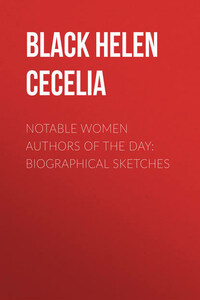A blue sky and a bright sun belie the typical foggy month of November, and while entering the elevator which glides rapidly and smoothly to the eighth floor of the gigantic pile of buildings once cynically termed "Hankey's Folly" – now Queen Anne's Mansions – you feel justified in anticipating a glorious view over the great city. You step out into a corridor where are arranged a stand of grenades with a couple of hydrants, backed by printed directions for their use, and are shown into the library of the distinguished author; but ere there is time to look around, the door opens, and Mrs. Lynn Linton enters.
Her personality may be described thus: tall, upright, and stately in appearance, the keen, but kindly bright blue eyes smiling through the gold-rimmed glasses which she always wears. She is clad in a suitable black dress, trimmed with jet, a white lace cap partially covers the thick grey hair, which escapes in a tiny natural curl or two on each side of the smooth, intellectual forehead. The eyebrows – far apart – are straight and level, but shaded off so delicately that they impart a look of benignity and softness to the aristocratic nose, while the curves of the well-cut lips indicate straightforwardness, sincerity of disposition, and power. Can it be possible that you had felt a momentary trepidation before meeting the gifted woman for whose genius you have ever entertained the greatest reverence? But Mrs. Lynn Linton will have none of it! Her kind and friendly greeting puts you at once at ease. She says that she has an hour or two to spare, that her work is well on, and that there is no immediate fear of her being disturbed by an emissary from the printers, so you settle down to have a good talk, and to learn from your hostess some particulars of her early life, and her subsequent eventful career.
Mrs. Lynn Linton was born at Keswick; her father being the vicar of Crosthwaite, Cumberland. When only five months old, her mother (a daughter of Dr. Goodenough, Bishop of Carlisle) died, leaving a family of twelve children. She was brought up plainly and frugally, with no particular advantages of education; nevertheless, at an early age she developed a strong taste for reading and a thirst for knowledge. Casting aside her childish story books, she dived into such ancient literature and chronicles as she found on her father's book-shelves, and at the age of eleven determined to train herself to be a writer. About this time she became keenly interested in Polish affairs, in which her favourite brother took an active part. In those days there were not the same facilities for procuring books as in later years, but the young child-student managed to overcome all obstacles, and educated herself, mastering French, German, and Italian. The one aim and end to which her ambition was directed buoyed her up through early years of what were somewhat rough times to the shy, nervous, short-sighted girl, who always seemed in everyone's way.
To this repression and self-training may be attributed the independence of thought, the thoroughness, the originality of idea, as well as the deep sympathy with young and struggling authors which are Mrs. Lynn Linton's prevailing characteristics. One of her earliest recollections is of the poet Southey, and that to this day she can recall to mind his peculiar face, his dark eyes, full of fire, his eagle nose, and thin figure. She wrote her first novel, "Azeth, the Egyptian," when she came to London, at the age of twenty-three, and from that day to this has supported herself entirely by her pen; but she says that this "first book" gave her a whole year's hard work to write, and she thinks it is now probably "unreadable." For her second, "Amymone," she will ever have the tenderest memories, and the blue eyes kindle when she remarks that it was the means of bringing her into contact with Walter Savage Landor, and securing for her his lasting sympathy and friendship. She says he was her literary father, her guide, philosopher, and friend, and that one of her dearest treasures is a large packet of letters from the poet, beginning "My dear daughter," and signed "Father" only, or "Your affectionate father," as well as those verses which he addressed to her, ending with the line, "Pure heart, and lofty soul, Eliza Lynn."
Between the production of "Realities: a Tale," in 1851, and "Witch Stories," there was a gap of ten years, which the young writer devoted principally to journalism. She was, indeed, the first of women journalists. She contributed to several of the daily papers and magazines. Presently a series of pungent and clever essays began in the Saturday Review, which increased its fame, and took the world by storm. "The Girl of the Period," "The Shrieking Sisterhood," "Paying One's Shot," "Mature Sirens," have now passed into proverbs. They made a famous topic of conversation at dinner-tables, and proved a decided hit. For many years a certain lady of rank had the credit of the series, until at last, after many futile efforts, Mrs. Lynn Linton was allowed to collect her own papers and publish them under her own name.








